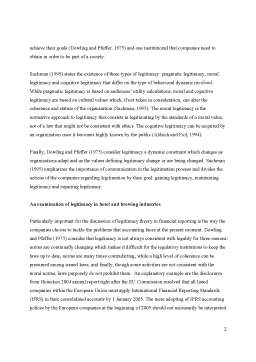Extras din referat
No longer than four decades ago a new theory, that was requesting organisations to disclose, untraditionally, information about employees, products, community or environment, was taking the shape as the so called ‘legitimacy theory.’ The aim of this essay is to evaluate the impact of legitimacy theory on the annual reports of the companies activating in the hotel and brewing sectors. The first part of the essay is a short review of legitimacy theory, followed by an examination of the above mentioned sectors and the last part concludes.
A Review of Legitimacy Theory
The legitimacy theory has its roots in the older philosophic concept of social contract which admits the possibility of significant advantages of cooperation amongst people over the existence in the State of Nature, or the state of uncooperativeness (Gauthier, 1986). Though the social contract perceives the individuals acting as self interested, the necessity of distributing civil liberties equally must prevail in front of obtaining economic advantages (Rawls, 1999).
Shocker and Sethi (1974, p.67) consider that due to the fact that ‘neither the sources of institutional power, nor the needs for its services are permanent’, an institution must demonstrate that ‘the society requires its services and that the groups benefiting from its rewards have society’s approval’ by delivering some socially desirable ends to the society and by distributing economic, social or political benefits to groups from which it derives its power.
Legitimacy theory is one extension of the social contract theory applied to the relationships amongst organizations and individuals and presumes that the existence of organizations is only justified as long as the social values associated with its activity fit within the norms of the society (Dowling and Pfeffer, 1975). A very common definition of legitimacy used in the economic literature is given by Suchman (1995, p. 574): ‘Legitimacy is a generalized perception or assumption that the actions of an entity are desirable, proper, or appropriate within some socially constructed system of norms, values, beliefs, and definitions.’
Two approaches to legitimacy theory can be identified in the literature: one strategic or organizational, which perceives legitimacy as an operation resource that companies use to achieve their goals (Dowling and Pfeffer, 1975) and one institutional that companies need to obtain in order to be part of a society.
Suchman (1995) states the existence of three types of legitimacy: pragmatic legitimacy, moral legitimacy and cognitive legitimacy that differ on the type of behavioral dynamic involved.
While pragmatic legitimacy is based on audiences’ utility calculations, moral and cognitive legitimacy are based on cultural values which, if not taken in consideration, can alter the coherence and stature of the organization (Suchman, 1995). The moral legitimacy is the normative approach to legitimacy that consists in legitimating by the standards of a moral value, not of a law that might not be consistent with ethics. The cognitive legitimacy can be acquired by an organization once it becomes highly known by the public (Aldrich and Fiol, 1994).
Finally, Dowling and Pfeffer (1975) consider legitimacy a dynamic constraint which changes as organizations adapt and as the values defining legitimacy change or are being changed. Suchman (1995) emphasizes the importance of communication in the legitimation process and divides the actions of the companies regarding legitimation by their goal: gaining legitimacy, maintaining legitimacy and repairing legitimacy.
Preview document
Conținut arhivă zip
- Legitimacy Theory in Hotel and Brewery Industries.doc







